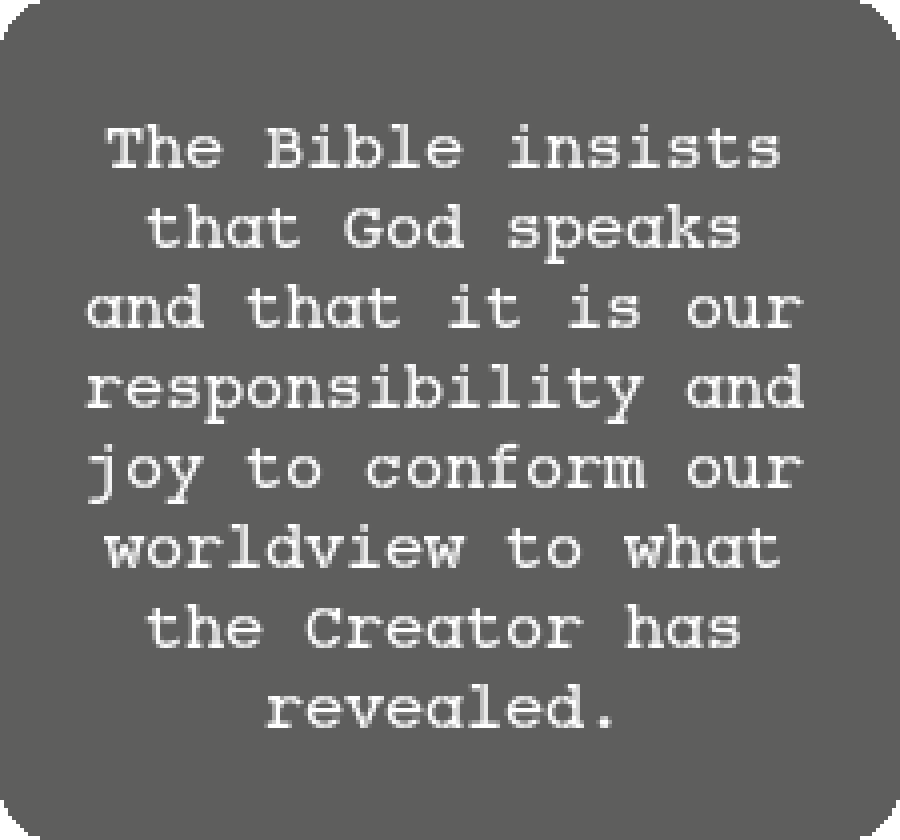What Is the Biblical Worldview?
Image

Human beings are hardwired to behave on the basis of what they believe. We dream and plan, will and act, emote and communicate according to our perception of reality. Each of us possesses a conceptual filter by which we interpret the world around us and that interpretation fuels our decisions.
At first, this conceptual filter is largely innate. I observed a newborn baby girl recently who capably communicated to everyone in the room that life was good in her mother’s arms and torture anywhere else. But as we mature, we gain the capacity to develop rationally the contours of our filter. Emotions (one’s fear of heights, for instance), affections (such as one’s love for family) and life experiences (say, suffering) will continue to play a large role in determining how we interpret life. Yet we can refine and even reform our perceptions by deliberately constructing a worldview that orders our beliefs and transforms our behavior.
The Bible is predicated on the counter-cultural premise that the establishment of one’s worldview is not a matter of individual freedom. Rather, the Bible insists that God speaks and that it is our responsibility and joy to conform our worldview to what the Creator has revealed. We are called to submit to God’s counsel such that our perceptions of reality are filtered through the framework of revelation and then to ethically respond to the implications.
The biblical worldview—the conceptual filter by which life is to be interpreted and actions weighed—may be summarized by four overarching themes which have been widely recognized by biblical scholars through the centuries.
Creation
The Bible does not belittle God by laboring to prove his existence. It assumes no other option is rational or safe. Rather, the Bible bursts out of the gate with the polarizing declaration: “In the beginning, God created the heavens and the earth” (Gen. 1:1). God created all things good (Gen. 1:31). He is the source, agent, and consummating glory of the universe (Ps. 19:1-4, Rom. 1:19-20, Col. 1:16). God made people in his image to commune with him in worship and serve as his vice-regents on earth (Gen. 1:26-27). If follows that the Creator has every right and full freedom to determine ethical behavior for his creatures, which he does for their ultimate good (Gen. 2:15-17; Exod. 20:3-17; Deut. 10:12-13, 32:46-47). Life is a gift from his hand; the universe our stewardship.
Fall
Paradise has been lost. By determining they could do better on their own terms, Adam and Eve violated God’s command and the universe was plunged into moral ruin (Romans 5:12, 18-19). Since Adam and Eve’s fall from their original standing in grace, it is now our natural bent to violate God’s law and live in disobedience to him, to war with others, and to pursue moral folly (Gen. 3:1-19, Rom. 3:10-12, Eph. 2:1-3, Titus 3:3). The root cause of all that is wrong in this world is sin—humanity’s fundamental orientation away from fellowship with God and obedience to his law. Idolatrous lawlessness, rather than reverent obedience, now epitomizes humanity’s relationship to God and his life giving words (Rom. 1:21-23, 1 John 3:4). In the perfections of his moral purity, God righteously opposes, and ultimately will judge, such moral infidelity (Rom. 1:18, 2 Thess. 1:6-9).
Redemption
God pursues sinners with saving grace. Fully deserving judgment, our moral rescue comes from above, not from within. It is received as a gift of the God who righteously exacts a just penalty for sin, but graciously provides a sacrifice to substitute for the sinner (Gen. 3:8-12, 21, Lev. 1:1-4, John 1:29). Rescue from our moral depravity is not provided by a weak God who merely overlooks sin. Nor is salvation achieved as we find goodness in ourselves. The good news is that redemption from sin is received as a gift from God and only on his terms (Eph. 2:8-10). These terms involve a turning away from our sins in repentance, throwing ourselves at the mercy of God, and trusting in his provision of forgiveness. The ultimate sacrifice for our sins is God’s eternal Son, Jesus Christ, whose death by crucifixion paid the penalty of sin and whose resurrection defeated death, ultimately for those who place their saving faith in his work (John 3:15-18, 1 Cor. 15:1-8, 2 Cor. 5:21, 1 Pet. 2:24-25).
Consummation
The biblical worldview not only looks at redemption from sin in this life, but at the final glorification of those who are now being transformed by the saving grace of Christ (Rom. 8:18-30, 2 Cor. 4:16-18). This hope is also tethered to an anticipation of Christ’s victorious return to set up his kingdom on earth (Rev. 19:11-20:1-6). Such hope, coupled with the reality of one’s eventual accountability before the throne of Christ (2 Cor. 5:10), radically reorients one’s interpretation of daily life.
There are many alternative worldviews. Most of them are tailor made by individuals who insist on constructing their own, individualized filter as the god of their own world. For those willing to receive by faith the worldview revealed in the Bible, the filter of creation-fall-redemption-consummation proves immensely serviceable. What is more, it produces stability and joy in the lives of those who learn to filter life through it. What less could be expected of a worldview supplied as a good gift by our all-powerful Maker and all-wise Counselor?
Pastor Dan Miller Bio
Dan Miller has served as the Senior Pastor of Eden Baptist Church since 1989. He graduated from Pillsbury Baptist Bible College in 1984 and his graduate degrees include the MA in history from Minnesota State University, MDiv and ThM from Central Baptist Theological Seminary and DMin from Trinity Evangelical Divinity School. Dan is married to Beth and the Lord has blessed them with four children: Ethan, Levi, Reed and Whitney.
- 9 views


Discussion